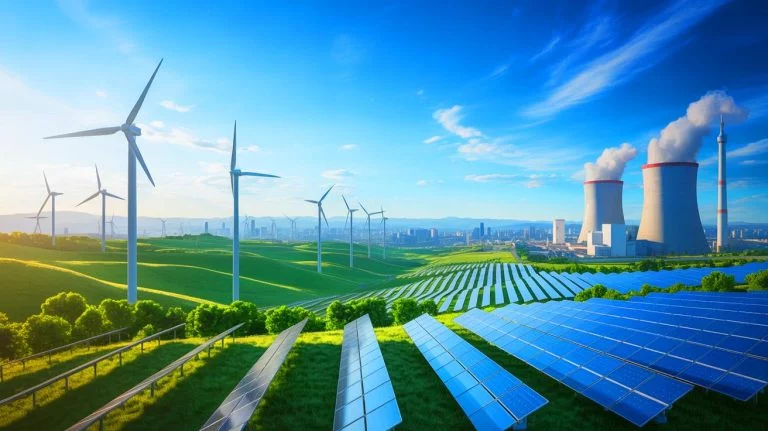| IN A NUTSHELL |
|
China’s recent achievement in reducing carbon dioxide emissions marks a significant milestone in global environmental efforts. For the first time, the nation’s emissions are decreasing due to the expansion of clean energy sources rather than a decline in economic activity. This development is particularly noteworthy given China’s historical reliance on fossil fuels to power its rapid industrial growth. The shift toward wind, solar, and nuclear energy has enabled China to reduce its carbon footprint while meeting rising electricity demands. However, this positive trend is fragile and may face challenges from new governmental policies and international trade dynamics.
China’s Emissions Decline: A Historic First
China has long been known as one of the world’s largest polluters, primarily due to its heavy reliance on coal and other fossil fuels. Yet, in a remarkable turn of events, the country’s carbon dioxide emissions have decreased by 1% over the past year. More impressively, a 1.6% reduction was observed in the first quarter of 2025 alone. This decline is attributed to the significant increase in clean energy sources, including wind, solar, and nuclear power. Such a reduction in emissions during a period of rising electricity demand underscores the impact of China’s clean energy investments.
The reduction in emissions is not only a first for China but also a potential game-changer in global climate efforts. Historically, China’s emissions have only fallen during periods of economic slowdown, such as in 2009, 2012, 2015, and 2022. This recent decrease, driven by renewable energy growth, offers a glimmer of hope for sustainable economic development. However, experts caution that this trend remains fragile and subject to external pressures.
The Role of Renewable Energy
China’s transition to renewable energy sources has been pivotal in reducing its carbon emissions. The country has made substantial investments in wind and solar power, resulting in a considerable increase in clean energy capacity. This shift is vital as China continues to experience growing electricity demands. The integration of nuclear power further diversifies the energy mix, reducing reliance on coal and other fossil fuels.
The success of China’s clean energy initiatives highlights the potential of renewable sources to address environmental challenges. However, the sustainability of this transition depends on continued support and investment. As China navigates this energy shift, it serves as an example for other nations striving to balance economic growth with environmental responsibility.
Challenges Ahead: Policy and Trade Dynamics
Despite the positive trends, China’s emissions reduction efforts face significant challenges. New tariffs imposed by the United States under former President Donald Trump could impact China’s economic landscape, potentially hindering the clean energy transition. Additionally, a new renewable energy pricing system set to launch in June could influence the cost dynamics of clean energy production.
These developments underscore the interconnectedness of global trade and environmental policies. As China works to maintain its emissions reduction trajectory, it must navigate complex international relations and domestic policy changes. The outcome of these efforts will have implications not only for China but for global climate initiatives.
The Global Implications of China’s Progress
China’s success in reducing emissions through clean energy growth holds significant implications for global climate strategies. As the world’s largest emitter of carbon dioxide, China’s progress sets a precedent for other countries. It demonstrates that economic growth can coincide with environmental stewardship, challenging the notion that fossil fuels are indispensable for development.
This development also raises questions about the future of global energy policies. Will other nations follow China’s lead in prioritizing renewable energy investments? Can international cooperation support a broader shift toward sustainable energy solutions? The answers to these questions will shape the trajectory of global climate efforts in the coming years.
China’s recent achievements in reducing carbon emissions through clean energy mark a pivotal moment in the global fight against climate change. However, the path forward is fraught with challenges, including policy shifts and international trade dynamics. As the world watches China’s progress, the question remains: how will other nations respond to this emerging model of sustainable development?
Did you like it? 4.6/5 (25)






Wow, China making more clean energy than fossil fuels? That’s a big deal! 🌍
Is this really a turning point or just another temporary trend?
Great job, China! Keep it up! 👏
Can we trust China’s energy reports?
Why aren’t more countries following China’s example?
This is great news for the planet! 🌎
How will this impact China’s economic policies?
China’s doing better than expected. Who knew? 🤷♂️
Can we expect a global shift towards renewables now?
Isn’t this just another example of greenwashing? 🤔
Will this change help reduce air pollution in China?
What role did international pressure play in this shift?
Is this just a PR stunt by the Chinese government?
How does this affect the global fossil fuel market?
It’s about time we see some positive news! 😊
Is this enough to meet the Paris Agreement goals?
Can this trend continue amidst global economic challenges?
Is nuclear energy really considered clean? 😬
How will this affect the US-China trade relations?
Thank you for shedding light on this important issue!
How does this change the global perception of China’s environmental policies?
Will this lead to a decrease in global fossil fuel consumption?
Are there any downsides to China’s clean energy push?
Thank you for sharing this hopeful news! 🌱
What does this mean for the future of coal in China?
This could be a game-changer for climate policy! 🎮
Anyone else skeptical about the numbers here? 🤔
How reliable are the statistics on China’s carbon emissions?
Does this mean we’ll see a drop in global warming soon?
China’s leading in clean energy? Didn’t see that coming! 😂
Are these changes sustainable in the long term?
More clean energy than fossil fuels? Sounds too good to be true! 😅
What are other countries doing to catch up with China?
How does this affect global energy prices?